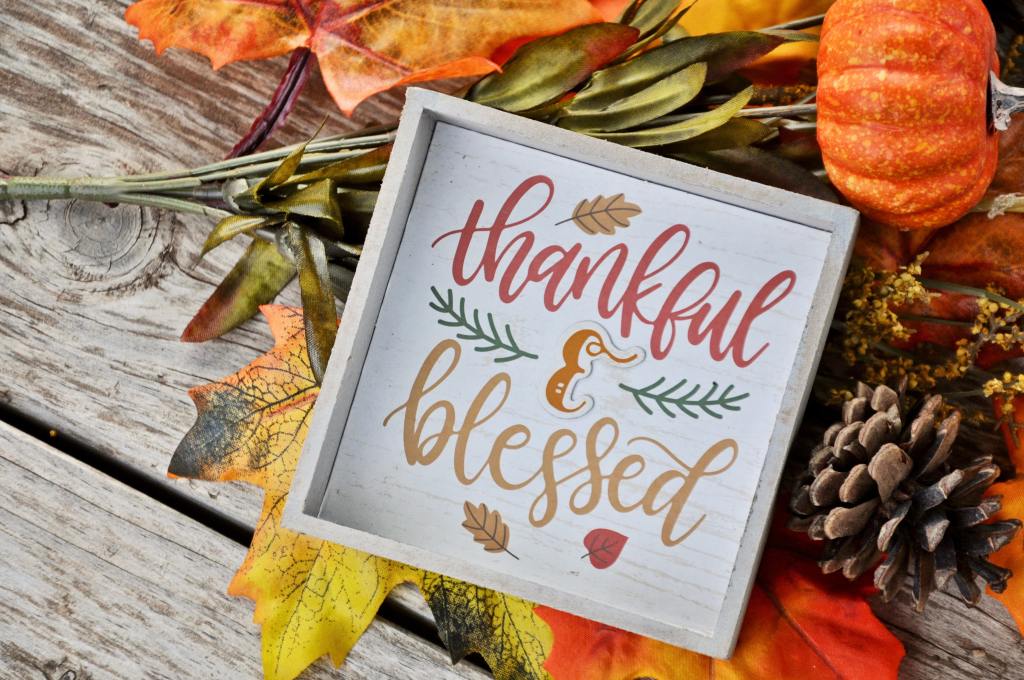Category Archives: attitude of gratitude
10 Fun Trivia Facts about Thanksgiving
Gratitude changes our attitudes and our actions. It changes how we live. This is the power of living a life of thanks; of gratitude for our blessings, whether those blessings are great or small. This is the power of Thanksgiving.
Photo by Kiy Turk on Unsplash
Here are some fun Thanksgiving trivia facts from the Good Housekeeping Magazine.
Question: What town canceled Thanksgiving because they couldn’t make pumpkin pies?
Answer: Colchester, Connecticut
A frigid bout of cold weather in the middle of October led to the Connecticut River freezing, so settlers couldn’t get their usual liquid sugar shipped on time from across the pond. Thus, the townspeople decided to postpone the holiday for a week in 1705. It was so legendary, Rose Mill Powers actually wrote a poem about it in a July 1908 issue of Good Housekeeping.
Question: What professional football team has played almost every Thanksgiving since 1934?
Answer: The Detroit Lions
George A. Richards, a former owner, purchased the Portsmouth Ohio Spartans in 1934 and moved them to Detroit. Rebranded as the Detroit Lions, George decided to host a Thanksgiving Day game against the world-champion Chicago Bears in hopes of attracting fans. The team has always played on Thanksgiving except between 1939-1944 due to World War II. The Dallas Cowboys also joined in on the Turkey Day tradition in 1966 and have played every Thanksgiving except in 1975 and 1977.
Question: What city is home to the oldest Thanksgiving parade?
Answer: Philadelphia
The Philadelphia Gimbel Brothers Department Store parade in 1920 had only 50 people, 15 cars and a fireman dressed as Santa Claus. The parade ended with Santa on his sleigh, signifying the arrival of the holiday season. Today, it’s much bigger and called the 6abc Dunkin’ Donuts Thanksgiving Day Parade instead. It was the inspiration behind the Macy’s Day Thanksgiving Day Parade which started in 1924.
Question: What did President Calvin Coolidge famously receive as a Thanksgiving gift?
Answer: A live raccoon
In November 1926, Vinnie Joyce of Nitta Yuma, Mississippi, sent the 30th President of the United States a live raccoon to be served as Thanksgiving dinner. However, the President became so smitten with the furry animal that he pardoned it and adopted it as a pet. He named it Rebecca.
Question: What wasn’t part of the first Macy’s Thanksgiving Day Parade?
Answer: Balloons
If you can’t imagine the Macy’s Thanksgiving Day Parade without giant floats featuring your favorite characters, you’d barely recognize the first parade in the early 1920s. It did have puppets riding the iconic floats, as well as singers and celebrities and of course, Santa Claus. That said, when the Thanksgiving parade made its big debut in 1924, it did have something that might be even crazier than balloons: animals from the Central Park Zoo.
Question: What happens to the turkeys that are pardoned by the president each year?
Answer: The turkeys pardoned by the president go on to live fulfilled lives.
President George H.W. Bush pardoned the first turkey in 1989 after he noticed the 50-pound bird at his official Thanksgiving proclamation looked a little nervous. Every president has upheld the tradition, ever since. But what happens to that lucky bird that lives to squawk another day? In 2005 and 2009, the turkeys went to Disneyland and Walt Disney World parks to serve as grand marshals in their annual Thanksgiving parades.
Question: According to Americans, what’s the best part of Thanksgiving?
Answer: The leftovers
Fans of the beloved turkey, stuffing and mashed potato leftover sandwich: You’re in the majority. Most Americans prefer Thanksgiving leftovers to the actual meal. Almost eight in 10 Americans agree that the second helpings of stuffing, mashed potatoes and of course pie beat out the big dinner itself.
Question: Do other countries celebrate the holiday?
Answer: Yes! Canada also celebrates Thanksgiving — but on a different day.
Our neighbors to the north also celebrate Thanksgiving, but they do so on a different day and for an unrelated reason. While American Thanksgiving pays homage to a feast between the pilgrims and the Native Americans, the Canadian celebration commemorates a feast between English explorer Martin Frobisher and his crew after their successful sail from England to the Canadian territory in 1578. Canadian Thanksgiving takes place on the second Monday of October every year.
That doesn’t mean there are zero similarities between the two holidays. Both American and Canadian Thanksgiving menus often revolve around turkey, and revelers in both countries frequently spend the day watching football marathons and festive parades. In Canada, the biggest one is the Kitchener-Waterloo Oktoberfest Thanksgiving Day Parade.
Question: How many people go shopping on Black Friday?
Answer: Over 32 million people
Even though many consumers think stores shouldn’t be open on Thanksgiving, a good chunk of us still shop on the holiday, according to the National Retail Federation. But not everyone heads to the mall before their meal settles. Black Friday still draws the biggest crowd of the entire holiday weekend, with 115 million people. A total of 69 percent of Americans chase those deals like a retail-driven Olympic sport.
Question: How much pumpkin pie do Americans eat every Thanksgiving?
Answer: An estimated 50 million pumpkin pies are devoured every November.
Some of us consider pumpkin pie a vehicle for whipped topping and could take it or leave it. If you’d also rather leave your pumpkins for Halloween and dig into another Thanksgiving dessert, you’re not alone. According to The American Pie Council, more Americans prefer apple pie overall – pumpkin pie only comes in second place.
HAPPY THANKSGIVING TO EVERYONE
Solitaire
10 Ways to Promote Happiness
Happiness – the often elusive thing that nearly everyone is searching for. We all have different ideas, preferences, and desires for our lives. But after years of scientific research, it has been suggested that certain things make the good majority of us happy. To be more specific, happiness does not result from reaching “bigger and better” signs of success, but rather from looking for contentment from new and fresh experiences in our quest for a life that is considered well lived. So, what kinds of experiences provide the best happiness benefits? Well, scientific study has discovered that these 10 ways will increase your everyday overall happiness:
- Make little changes in your daily routine, such as getting more sleep, exercising, getting out into nature, and meditating.
- Read more books. Read books to learn—research suggests that lifelong learners remain healthy and engaged, and live long lives. Read books as an escape from your everyday life, Read books—it will make you happy. (One of my personal favorites. I have always loved to read, and write as well. Check out my books at www.solitaireparke.com)
- Find your right fit or match, both personally and professionally. If you love what you do and who you are with, you’ll position yourself for personal happiness and professional success.
- Be grateful. Two specific activities help foster a greater sense of gratitude. First, keep a daily gratitude journal. Second, pay a “gratitude visit” to someone from your past that has had a significant impact on your life, and let them know how you feel.
- Smile more—even if you don’t feel like it. Research shows that the simple act of smiling can trick your brain into a happier state.
- Take pleasure in simple, everyday moments. Appreciating life’s small moments, such as a beautiful sunny day, plants sprouting from the ground, and skipping rocks at the beach, teaches you to be more grateful for what you have, especially during moments of stress and anxiety.
- Perform random acts of kindness. Do good deeds. Volunteer. Be charitable. Shop for someone else! Studies have shown that you can help yourself by doing good things for others.
- Spend money on experiences versus things. Studies have shown that buying an object—a car, handbag, or kitchen gadget—can quickly lead to buyer’s remorse. On the other hand, investing in experiences—a concert, a camping trip, music lessons—leads to greater happiness. Experiences create “happiness residue,” and our perceptions of them often get better over time.
- Avoid comparisons. Whatever you may think of someone else’s life, particularly as viewed through the phony, filtered lens of social media, it’s almost certainly messier than you imagine. It’s easier to embrace and learn to love your own imperfections, if you don’t conjure up myths about how perfect everyone else’s lives seem.
- Build and maintain close relationships. Having a small number of tight, meaningful relationships is one of the highest predictors of happiness. (Pets are wonderful companions too!)
We all lose sight of some of the happiness priorities, so don’t feel bad if you do. In this world we battle on a daily basis the relentless marketing and expectations of society that attempt to lead us down paths to happiness that lie somewhere else. We don’t need to over-complicate things. It’s the simple things in life that matter most. Live each moment with purpose and intent – live each moment as if it were your last and enjoy the people around you. You have one life – so live each minute to the fullest!
“Attaining lasting happiness requires that we enjoy the journey on our way toward a destination we deem valuable. Happiness is not about making it to the peak of the mountain nor is it about climbing aimlessly around the mountain; happiness is the experience of climbing toward the peak.”
Solitaire







